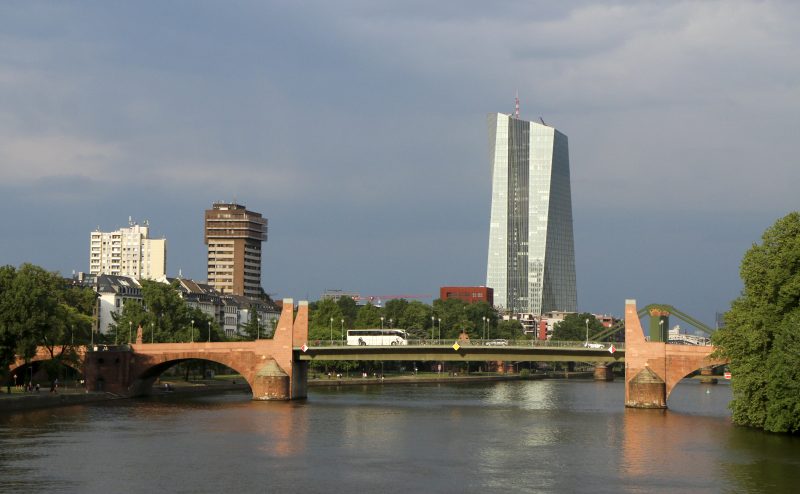ECB springs into action as forecasts tumble
The European Central Bank in Frankfurt announced fresh measures to juice the slowing eurozone economy (Yann Schreiber)
Frankfurt am Main (AFP) – Tumbling growth and inflation forecasts for the eurozone prompted the European Central Bank to promise interest rates will stay lower for longer and offer new low-cost loans to banks, chief Mario Draghi said Thursday, while striking a reassuring tone on the bloc’s prospects.
“We’re coming out of, and maybe we still are in a period of continued weakness and pervasive uncertainty,” Draghi told reporters in Frankfurt, pointing to “factors… mostly of external source” that were weighing on the single currency area.
The Italian namechecked “the threat of protectionism” and “geopolitical considerations, also what happens relating to the United Kingdom” as it exits its close trading relationship with the European Union later this month.
Meanwhile a slowdown in emerging markets like China, which earlier this week pared its own growth forecasts, also looms over the eurozone.
That prompted ECB economists to match other international bodies by slashing their growth outlook for 2019 by 0.6 percentage points, to 1.1 percent, and trim the 2020 forecast slightly, to 1.6 percent.
Inflation is now slated to inch up from just 1.2 percent this year to 1.6 percent in 2021 — well short of the central bank’s price stability target of just below 2.0 percent.
– ‘Proactive’ response –
The weaker outlook meant that just three months after ending a 2.6-trillion-euro ($2.9 trillion) “quantitative easing” (QE) stimulus for the 19-nation eurozone in December, the ECB was under pressure to show it still had options to buttress growth.
The end of the massive QE programme and rates fixed at historic lows gave the appearance of little room to manoeuvre.
In response, Draghi said, the ECB would “try to be proactive rather than reactive”, intervening to cushion the economy against potential blows.
Referring to widespread uncertainty — including on potential positive surprises like a US-China trade truce or an eleventh-hour Brexit deal — he said that “in a dark room you move with tiny steps, you don’t run, but you do move.”
For economist Marcel Fratzscher of Berlin-based think tank DIW, “the ECB sent a surprisingly clear warning signal today.”
“The eurozone economy is weakening noticeably and risks are rising. As a result, the ECB is making monetary policy even more expansive.”
By 4:25 pm in Frankfurt (1525 GMT) the euro had shed 0.65 percent against the dollar to trade at its lowest level since November.
– Still growing –
Draghi took pains to paint a picture of the eurozone economy in less pessimistic terms than many analysts.
“It’s all still talking about weaker growth… the economy continues to expand, the labour market continues to add jobs, nominal wages continue to grow,” he said.
“We assess the probabilities of a recession as being very low.”
The ECB chief counselled patience when it comes to the eurozone’s years-long gradual expansion — fuelled by supportive monetary policy from Frankfurt — finally feeding through into inflation rising towards its target.
Nevertheless, “we maintained the risk assessment as tilted to the downside,” he acknowledged.
“Our measures certainly increase the resilience of the eurozone economy,” he said, but “cannot” solve the external dangers hobbling growth.
“We doubt… that the new measures will be enough to reverse the economic slowdown” agreed Capital Economics analyst Andrew Kenningham.
ING bank economist Carsten Brzeski labelled the big-bang move “a bit of a gamble”.
“Any next step from here to tackle a severe downswing of the economy would now require unprecedented measures,” he noted.
– Cheap loans to banks –
The ECB’s renewal of its so-called TLTRO scheme will allow banks to borrow from the ECB for periods of up to two years once per quarter between September 2019 and March 2021.
“These new operations will help to preserve favourable bank lending conditions and the smooth transmission of monetary policy,” the ECB said.
Like previous rounds of TLTROs, the programme “will feature built-in incentives for credit conditions to remain favourable”.
In the past, those incentives have included negative interest rates for banks showing they were lending more to firms and households — effectively meaning the ECB would pay them to borrow its cash.
The ECB has loaned banks more than 700 billion euros ($790 billion) in previous TLTRO rounds.
Disclaimer: This story is published from a syndicated feed. Siliconeer does not assume any liability for the above story. Validity of the above story is for 7 Days from original date of publishing. Content copyright AFP.


